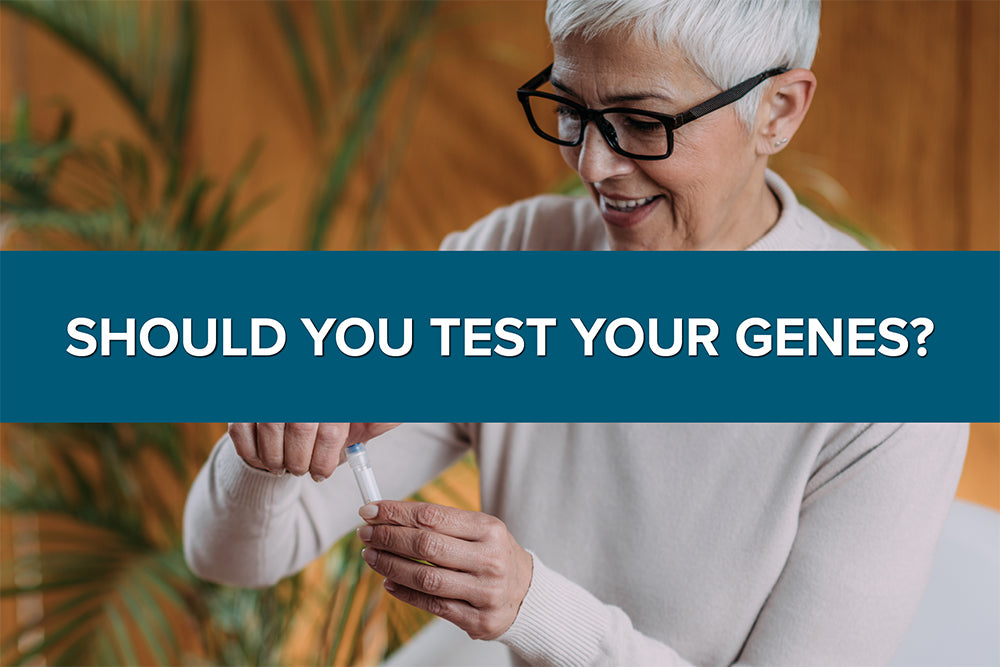
800-547-9812
800-547-9812
800-547-9812
800-547-9812

Genetic home testing has become wildly popular in recent years. In the past, the only genetic testing offered was through healthcare providers when there was an increased family risk of a particular health issue. Take breast cancer for example. Testing for the BRCA mutation status, doctors can identify risk factors that give more information to act.
In recent years, anyone can have access to their genetic information from the comfort of home. Simply fill a tube with saliva and wait for the results!
Previously there were only a few options on the market. When test results were received, they needed to be plugged into various apps or programs that could interpret the data, often yielding confusing and complicated results.
Dr. Ben Lynch recognized the need for an at-home genetic testing kit that provides users with easy to interpret, actionable information. That’s why he created the StrateGene® DNA Kit—to help you take your healthcare information into your own hands.
StrateGene® provides comprehensive genetic data, just like any other home DNA test. But with StrateGene®, your genetic results are displayed on a map of the body’s biochemical pathways. This gives you a big picture visual interpretation of how your genes are influencing your health. The StrateGene® DNA Kit also comes with free educational materials to empower your understanding of the results.
Before we dive into why you might consider StrateGene®, let’s look at what exactly you could learn from doing a home-test genetic kit.
Most doctor offices will conduct genetic testing via blood samples. Home genetic test kits rely on a saliva sample that you collect yourself in the convenience of your own home. You then mail your sample to the lab where your results are analyzed.
After analysis, the lab provides raw data—basically the ins and outs of the specific set of genetic SNPs (or variants) that you have. Depending on the service you used to test your DNA, the raw data is interpreted into results emphasizing information of the testing company’s choosing. Popular DNA test companies display information such as ancestry, or basic health information like “your eyes are more likely to be brown” or “you're likely to have a dairy intolerance”. When it comes to taking steps to optimize your health, often the information provided by these companies isn’t all that helpful.
Third party websites now exist where you can download your raw data and run it through various programs, which provide slightly more helpful information, such as MTHFR genetic status. However, unless you have a medical background, these genetic results can be difficult to interpret, even for medical professionals.
Understanding the need for a genetic test that provides relevant and actionable information, Dr. Lynch created StrateGene®, which is both a DNA test and a genetic reporting tool that helps to quickly identify and address potential health issues by overlaying each person’s unique SNPs (single nucleotide polymorphisms) onto the most important biochemical pathways in the human body. This visual tool makes it easy to see where you need the most support, and why. With this information, you and your health care providers can quickly formulate a targeted healthcare plan—that works.
In the age of health information, many people have completed genetic home tests out of curiosity or because they were trying to get to the root of complex health issues that nothing else could explain.
But there are several key reasons that fall somewhere in between as to why you might want to get your genetic information tested.
1. Get to the root of complex health issuesWhile genetic tests are not diagnostic, certain combinations of genes can lead to known issues. By discovering what your genetic mutations are, you may be able to understand some risk factors and rule others out.
For example, the MTHFR C677T polymorphism has been associated with depression, particularly in those with the CC genotype. This does not mean that everyone who has this SNP will automatically have depression, but rather, that research has noted an association between people who are already depressed and the presence of this genetic variant. (1)
If you have this variant but have never struggled with depression, it does not mean that you will become depressed at the drop of a hat. Instead, if you have this variant and have frequently struggled with depressive episodes, you and your healthcare provider may now have a new angle with which to address your ongoing mental health needs.
The C677T polymorphism has also been associated with autoimmune disorders like multiple sclerosis, chronic disorders like diabetes and non-alcoholic fatty liver disease, as well as coronary artery disease and clotting disorders. The susceptibility to each of these conditions tends to be related to elevated homocysteine levels and/or inadequate folate available to the methylation cycle. Previous research indicated that Factor V Leiden was the most crucial factor in weighing risks of thrombophilia, but mutations in MTHFR—especially C677T—are now considered to be equally as important when assessing risk factors. (2, 3, 4, 5, 6, 7)
2. Helps healthcare providers direct your careAs mentioned above, genetic information can help your healthcare providers give you more targeted instruction and information. While they’re certainly capable of working to address needs based on your symptoms alone, in the age of health information, the more data they have to work with, the better (and quicker) your results will be.
Genetic home tests can provide helpful information in many areas. For example: methylation status, blood clotting risk factors, thyroid health, or even various food allergies like gluten intolerance.
However, it’s important to note that genetic home tests are not the most comprehensive way to rule out serious inherited disorders like breast cancer or other types of cancer. These genetic tests need to be done by medical diagnostic facilities to ensure that every proper gene is tested.
3. Optimize supplementationHave you ever tried a supplement that didn’t give you the expected results? Your methylation status can have a significant impact on how you feel when you take certain nutrients like B vitamins.
Some genetic variations can cause methylated forms of folate or B12, for example, to promote feelings of good health and mental clarity. But for others with slightly different variations, they could be left feeling anxious, overstimulated, or manic.
The need for various forms of nutrients are directly impacted by your genetic variations. Providing this information to your healthcare provider could lead them to a more informed recommendation. For example, folinic acid easily converts to the active form of folate in the body, but isn’t pre-methylated and therefore can be easier to absorb for some with MTHFR variations, or those who are otherwise over-stimulated by nutrients in their methylated forms.†
4. Feel empowered to take control of your health journeySome people avoid getting home genetic tests done, or medical testing otherwise, because they fear the results. But when it comes to learning what genetic variations you carry, the good news is that it is not a diagnosis or guarantee of any specific outcome. It is merely a presentation of the blank canvas that your body has to work with.
As Dr. Lynch says, “Your genes are not your destiny.”
Even if you discover that you have a homozygous (or two-copy) variation for a certain gene, it does not mean that you are guaranteed to experience a negative outcome as a result. Genes are influenced heavily by your external environment, your diet and lifestyle, your stress levels, and even your digestive health. Much like an artist can select which artistic medium to work with, and choose their own color palette, you have influencing choices over how your health plays out.
By understanding what genetic variations you have, your healthcare provider can present you with more informed options and you will feel more clued-in as to what’s going on in your body. Understanding your genetic landscape is both empowering and extremely helpful when making decisions about your health and lifestyle.

While all genetic home tests work similarly, the information they provide varies tremendously. StrateGene® is a new option for home testing created by Dr. Ben Lynch, a world-leading expert in nutrigenomics, that is, the study of how nutrients and genes interact to promote health or disease. Dr. Lynch is also the founder of Seeking Health, a company providing high-quality, bioavailable supplements and education—the tools needed to optimize your genetic health and overall wellness.
The information you’ll glean from StrateGene® is targeted to help you identify the genetic obstacles in your body. This knowledge will help you make informed choices on customizing diet, lifestyle, supplements, and other environmental factors to support your ongoing good health. This information can also help your healthcare provider create a targeted plan for you that is effective, to eliminate the trial-and-error that all too often directs medical treatments.
It is of paramount importance to understand if the supplements and medications you’re taking are right for you. If you’ve experienced frustration at not knowing which supplements to take, or you’ve felt like the ones you’re taking might not be making things better, StrateGene® can help you obtain more targeted information going forward.
StrateGene® is not a magic bullet and it won’t diagnose you with anything. Rather, the information provided can help you understand the baseline you’re working with. It can also help your healthcare provider customize your supplementation routine, make better recommendations for treatment plans, and even explain factors you’ve not understood before.
Learn more about the StrateGene® Genetic Test here
If you’re curious about your genes and how the information they give could be used to optimize your health, the first step is to order the test kit. It will be shipped directly to your home. You can rest assured knowing that we go to great measures to protect your personal information.
From there, simply follow the step-by-step instructions and provide your saliva sample, returning it to the lab in the box provided. After a few weeks, your results will be added to your private account and you will receive an email notification when they’re ready for viewing. You can look them over yourself, compare them to the pathways provided, and share them with your healthcare provider. You can even work with a qualified StrateGene® practitioner to help you interpret the results and come up with a customized treatment plan.
Everyone has the same set of genes, but they exist in various forms or mutations. You get this inherited information from your parents, which combines into your own unique set of genetic data. This is a map of numerous possibilities. Your genes don’t present a diagnosis or a guaranteed outcome. They simply show you the raw materials that your body has to work with.
From there, lifestyle, dietary, and environmental factors control how your genes work. Genetic variations can be turned off or turned on, much like the idea of a light switch. You always have electricity available, but several factors influence whether the lights are on or off.
Ultimately, finding out what your genetic landscape looks like is the most useful knowledge you can have for your own wellbeing.
StrateGene® was designed to guide you on the journey of optimizing your health. As the old adage goes, “Knowledge is power”. Understanding how your genes interact with your environment is a powerful awareness and the first and most important step in living your best life.
Learn more about the StrateGene® DNA Test here.
Reference:
(1) https://www.ncbi.nlm.nih.gov/pmc/articles/PMC6218441/
(2) https://pubmed.ncbi.nlm.nih.gov/25203152/
(3) https://pubmed.ncbi.nlm.nih.gov/16828193/
(4) https://www.ncbi.nlm.nih.gov/pmc/articles/PMC4953108/
(5) https://pubmed.ncbi.nlm.nih.gov/18204887/
(6) https://www.ncbi.nlm.nih.gov/pmc/articles/PMC3935237/
(7) https://www.ncbi.nlm.nih.gov/pmc/articles/PMC4757050/
Leave a comment